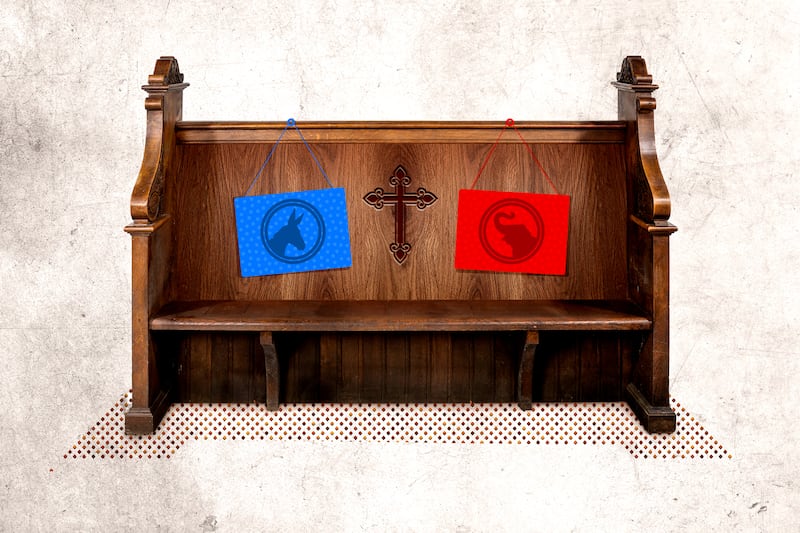SALT LAKE CITY — The Rev. Robert Jeffress, one of President Donald Trump’s evangelical Christian advisers, isn’t entirely satisfied with the Republican Party’s policy efforts.
He wishes Republicans would take meaningful steps to ensure “crazy people” can’t buy guns and commit to preserving the Affordable Care Act until a reasonable alternative exists.
“I think it’s dangerous to too closely associate yourself with any political party,” he said.
Guthrie Graves-Fitzsimmons, the author of a forthcoming book on the Christian left who identifies as a Democrat, also sees his party as imperfect. He wants Democratic candidates to be bolder in their plans to address economic inequality and climate change, and adopt foreign policy positions that will bring an end to endless wars.
“There is room to criticize the Democratic Party,” he said.
However, neither the Rev. Jeffress nor Graves-Fitzsimmons plan to withhold their support until changes are made. They think the stakes of the 2020 election are too high to hold back from doing what they can to ensure their party wins.
“I think it’s dangerous to too closely associate yourself with any political party.” — Rev. Robert Jeffress
“The Christian thing to do is vote Democrat,” said Graves-Fitzsimmons, who is Baptist.
The Rev. Jeffress has similar feelings about voting Republican.
“We have seen very clearly the Democratic candidates for president say from the debate stage that they would be for continuing the barbaric practice of continuing late-term abortion” and revoke important religious freedom protections, he said.
Animosity toward the political party you don’t support is pretty much par for the course these days, according to an October survey from Pew Research Center.
Around 8-in-10 Republicans and Democrats today have “cold” feelings toward members of the opposite party, up from about two-thirds in March 2016, Pew found. Close to half say their political opponents are more unintelligent or immoral than other adults.
This partisan acrimony is, in some ways, derailing the democratic process. Voters can be so fixated on defeating their political enemies that they fail to examine and then address their own party’s flaws, said Justin Giboney, an attorney and political strategist based in Atlanta, Georgia, who focuses on outreach to Christian voters.
“If you think your party represents everything Christians can be in politics, then you don’t see the errors on your side of the aisle,” he said.
Giboney and others involved in the And Campaign, an initiative aimed at improving people of faith’s political habits, wants Christian voters to expect more of their parties and stop being complacent. In a new statement on the 2020 election, which is joined by dozens of religious leaders from across the political spectrum, they said no one should settle for their parties’ current approach.
“It’s not up to the party to tell us what to believe. The party is supposed to represent what we believe,” said Giboney, who co-founded the And Campaign.
For many Americans, political parties don’t live up to this standard. Nearly half of Republicans (45%) and Democrats (47%) believe their party is too extreme in its positions, Pew reported.
“You don’t expect to hear a more nuanced voice on some of the toughest issues, like poverty, immigration, religious liberty and abortion,” Giboney said.
The lack of nuance is problematic for all sorts of voters, but the And Campaign is particularly concerned with what it means for Christians. Biblical values like serving the poor, ending discrimination and caring for immigrants don’t fit neatly into either party’s platform, the statement explained.
Christian leaders who joined the statement profess support for the unborn, which is a key Republican concern, but also condemn the Trump administration’s approach to immigration policy. They call for expanding voting rights, which many Democratic candidates advocate for, but also criticize efforts to punish religious conservatives for failing to embrace the LGBTQ community.
To be clear, these values aren’t shared by all Christians. For example, plenty of evangelicals are perfectly happy with Trump’s approach to immigration, while Graves-Fitzsimmons and other more liberal Christians say their faith is why they support expanding abortion rights.
The purpose of the statement isn’t to ensure Christians all speak with one voice on political issues, said Michael Wear, chief strategist for the And Campaign. Instead, it’s to urge them to think critically about whether they’re letting their preferred candidates off the hook on moral concerns.
“Christians can hold both parties accountable to a vision for the common good that is not fully represented in either party platform,” the statement explained.
But what does living up to this vision actually look like? At the end of the day, Christian voters have to choose between existing candidates, just like everyone else.
Giboney and other And Campaign supporters said each Christian voter’s answer could be different. The important part is for voters start demanding more than the status quo.
For Giboney, values-based voting means being more open about his candidates’ flaws and continuing to challenge them to do better even after Election Day 2020 has come and gone.
“I have to say, ‘I voted this person in but their position on abortion or religious liberty isn’t where it needs to be.’ I’ve got to push back on the issues they’ve missed,” he said.



